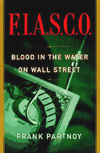Resources > Publications > My Book Reviews
My Book Reviews
 Category: Wall Street insider
Category: Wall Street insiderPublished: 1999
Read: 2001
Reviewed: Jun 2010
Published in 1997, F.I.A.S.C.O. (which stands for "Fixed Income Annual Sporting Clays Outing" and refers to a corporate outing the author went on) details the author's experience with getting a job as an emerging markets derivatives salesman on Wall Street. He began at investment bank First Boston and left to go to the more prestigious Morgan Stanley. He illustrates the different types of derivatives (PERLS, PLUS Notes, BIDS) and talks in detail about the various derivatives deals that he worked on, including the regulatory process, technical details, and marketing of the derivatives. There were a few random topics which were interesting, including: the profile of Morgan Stanley president John Mack, a brief history of First Boston and Morgan Stanley, his interview at Bankers Trust, and the annual bonus process.
This book talks in depth about the high-profile losses at Orange Country, Kidder Peabody (Jospeh Jett), and Proctor & Gamble. It does a good job in showing how and why derivatives blow-ups happen, specifically the lack of knowledge about the fundamentals of derivatives by most of the people involved with them. Although the author describes derivatives in a tongue-in-cheek manner as "financial gizmos that suddenly become worthless and then appear on the front page of the Wall Street Journal", this is not an altogether inaccurate description.
This book is more serious than the other books by Wall Street insiders (like "Monkey Business" or "License to Steal"). It is more about the products and processes than it is about colorful personalities. It blends details of real-life derivative deals with educational tutorials. The book talks about the need for greater regulation and presciently talks about the failure of the ratings agencies like Moodys to see the risks of derivatives.
"What makes CMOs especially dangerous is that although they're extremely risky, they can appear quite safe. One deceiving and dangerous aspect of CMOs is their credit rating; AAA. Because payments on most CMOs are guaranteed by an agency of the federal government, the companies who rate the bonds' credit quality, Standard and Poor's and Moody's, assign most CMOs their highest credit rating. But this AAA rating is misleading. Although an agency of the federal government is unlikely to default on its guarantee, default is only one of the risks associated with CMOs. Investors in CMOs can and do lose money for other reasons, including the risk of prepayment of principal. These additional risks are not captured by the AAA rating. . . . Because mortgage payments are so unpredictable, even the most sophisticated investment banks that actively trade mortgages have suffered significant losses."
Book Reviews
Individual Reviews
- Reminiscences of a Stock Operator
- The New Market Wizards
- Market Wizards
- Michael Sivy's Rules of Investing: How to Pick Stocks Like a Pro
- Liar's Poker
- In the Company of Giants
- The Power of Cult Branding
- Sam Walton: Made in America
- Trump: The Art of the Deal
- Monkey Business
- F.I.A.S.C.O.
- Pit Bull
- One Up On Wall Street
- Confessions of a Wall Street Analyst: A True Story of Inside Information and Corruption in the Stock Market
- Aol.com How Steve Case Beat Bill Gates, Nailed the Netheads, and Made Millions
- Secrets of the Temple: How the Federal Reserve Runs the Country
- Den of Thieves
- Investment Biker
- Martin Zweig's Winning on Wall Street
- Soros on Soros: Staying Ahead of the Curve
- The Millionaire Next Door
- Do You Want to Make Money or Would You Rather Fool Around?
- Wizards of Wall Street
- License to Steal
- Stock Market Wizards
- Intuitive Trader
- The Winning Trader: Developing a Mental Edge for Market Success
- The Great Reckoning: Protecting Yourself in the Coming Depression
- The Winner Take All Society
- Trump: The Art of the Comeback
- Sure-thing Options Trading: A Money-Making Guide to the New Listed Stock and Commodity Options Markets
- Secrets of the Street: The Dark Side of Making Money
- Trading Systems: Secrets of the Masters
- Wallstreet.Com: Fat Cat Investing at the Click of a Mouse : How Andy Klein and the Internet Can Give Everyone a Seat on the Exchange
- The Future of Capitalism
- Investment Gurus
- The New Gatsbys: Fortunes and Misfortunes of Commodities Traders
- Riding the Bull: My Year in the Madness at Merrill Lynch
- The Education of a Speculator
- Warren Buffett: Master of the Market
- Dangerous Company: The Consulting Powerhouses and the Businesses They Save and Ruin
- The New Money Masters
- Forbes Great Minds of Business
- The Millionaire Mind
- Real People: Real Traders How People Like You are Making it in the Markets
- When Giants Stumble
- Beyond the Numbers: How Leading Companies Measure and Drive Success
- Dumb Money: Adventures of a Day Trader
- A Million A Minute
- The Four Cardinal Principles of Trading
- The Day Trader's Advantage
- Everything You've Heard About Investing Is Wrong
- The Money Masters
- NLP For Traders
- American Sucker
- Making it In Commodities
- Traders' Tales: A Chronicle of Wall Street Myths, Legends, and Outright Lies
- The Best: TradingMarkets.com Conversations With Top Traders
- Money: Who Has How Much and Why
- Charlie D.: The Story of the Legendary Bond Trader
- The Electronic Day Trader
- The Delta Phenomenon
- The Fortune Tellers
- How To Buy Stocks
- How the Stock Market Works
- Traders: The Jobs, The Products, The Market
(Not available: ebook, pdf, free download, audiobook, download on scribd, online preview or summary.)



